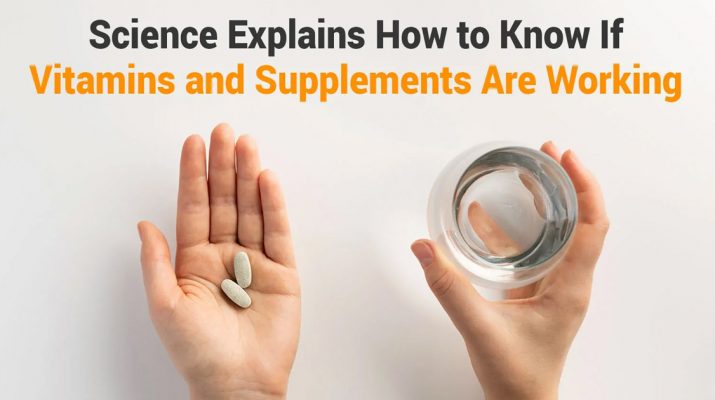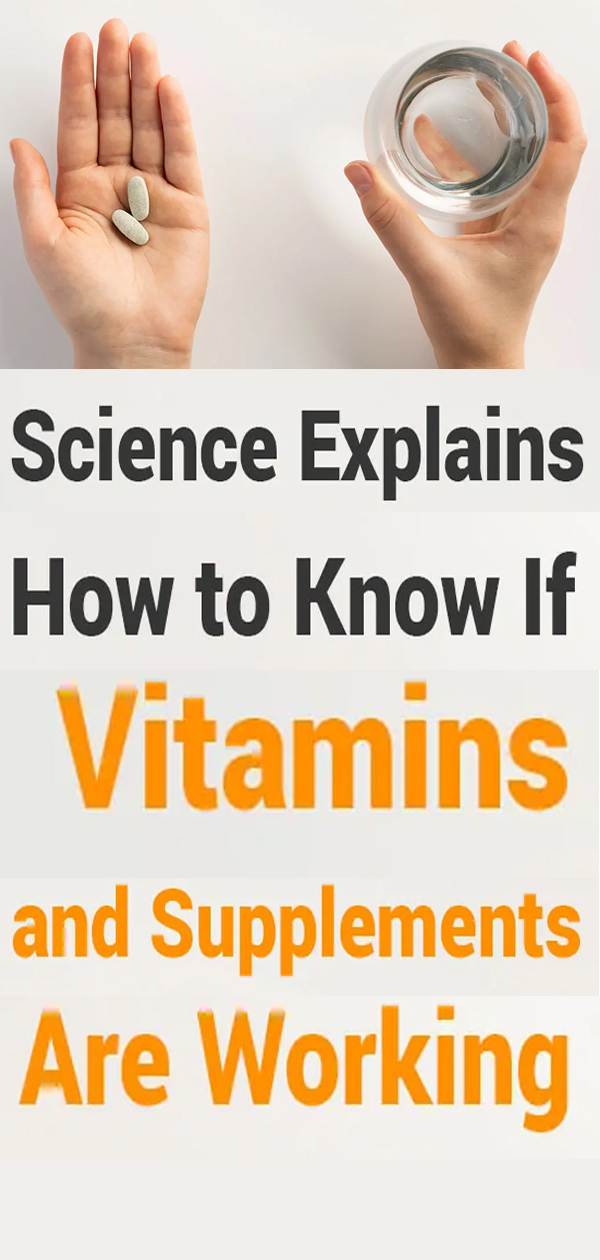We have all walked down the overfilled over-the-counter medication aisles. There we find shelves stacked with homeopathic treatments, vitamins, minerals, and herbal treatments for a multitude of ailments. We see almost limitless options.
“Taste the rainbow” takes on a whole different meaning when it comes to choosing any supplement based on the visual options alone.
Which one to buy? Is the more expensive brand more effective than the generic option? Am I paying too much? Those are just a few of the questions that we consider when trying to choose.
Once you choose, however, how do you know if it is working? Science explains how to tell if vitamins and supplements work for you.
Supplements And The Fda
Supplements are a 31 billion USD market in 2018 in the United States alone and 124 billion USD market globally. Statisticians predict it to reach 56.7 billion in the U.S. by 2024 and 210.3 billion globally by 2026. The main reason for the increase is the rising cost of health care.
Considering the size of such a market, you would think that someone monitors supplements for quality. The FDA, or Food and Drug Administration, is responsible for analyzing studies and reports from companies before putting prescriptions or over-the-counter drugs on the market. However, the agency does not verify supplements before placing them on the shelf.
The FDA categorizes supplements as: “vitamin; mineral; herb or other botanical; amino acid; dietary substance for use by man to supplement the diet by increasing the total dietary intake; or a concentrate, metabolite, constituent, extract, or combination of the preceding substances.” Supplements are viewed as just that, a supplement to a person’s diet and are not designated to “treat, diagnose, prevent or cure a disease.”
They require that manufacturers place this warning on every label.
Manufacturer Responsibility
The burden of proof goes to the manufacturer. It is their job to do their research and put out a supplement that follows established production, storage, and packaging guidelines and is safe for use. Should a new drug be used, then the manufacturer must submit reports to the FDA to ensure it is safe. Note: safe is not the same as effective.
Once a supplement is on the market, it is the responsibility of the FDA to take action if there is evidence of the supplement being mislabeled, making false or scientifically unproven medical claims or if the ingredients have been altered or shown to be unsafe.
On the FDA website, they do have a list of supplements that are recalled. Additionally, if an individual believes a supplement or any drug is making you sick, it is of poor quality or mislabeled, then they can go to the FDA’s MedWatch page and file a report.
Consumerlab.Com And Labdoor.Com, Step In.
With the FDA not providing any real guidance regarding supplements, two consumer groups have stepped in to provide information: ConsumerLab.com and Labdoor.com.
Each company runs its tests of supplements in stores and online to test for verification of the ingredients, quality of ingredients, the potency, how pure it is, its bioavailability, and consistency. Each lab issues a report in regards to their findings and has some form of a rating system.
Here are the specifics regarding each group:
Consumerlab
ConsumerLab.com is a privately held company founded in 1999 whose goal is to “identify the best quality health and nutrition products through independent testing.” Their site is divided into multiple divisions in addition to test results. They include where to buy the products, a Natural Products Encyclopedia and Recalls and Warnings as issued by the FDA, Federal Trade Commission and Health Canada.
They use independent labs to test various products, including vitamins, minerals, herbals, sport, and energy products. These results are the purpose and focus behind the website. They do describe their criteria and guidelines for determining the results of the purity, bioavailability, potency, consistency, and verifying the identity of the ingredients used.
They Break Reports Into Four Sections:
- Background: Tells the consumer about the product and how it is commonly used
- Test Methodology: Explains how products were chosen for the test and criteria to establish a rating and any quality concerns.
- Results: Provides a summary of the results and if they met the criteria
- Consumer tips: Supplemental advice to consumers taking the product.
The amount of information you can receive may vary depending upon if you have paid a subscription fee or not. They rate supplements on a “pass” or “fail” standard. Vendors of the supplements which have passed can pay to receive an approved quality product seal to add to their packaging.
Labdoor
Labdoor.com is a relative newcomer. Founders formed the site 2012 but didn’t fund it until 2014. Its primary focus is to provide supplement analysis information pages. After testing is complete, they issue a press release regarding their findings.
Rather than just utilizing the website, these press releases are posted on their social media platforms for anyone who follows. The results of the studies are free to the public. They earn their money through affiliate links and the sale of supplements on the site.
Upon going to the site, I saw that they offer a point system for the products with ratings related to label accuracy, product purity, nutritional value, ingredient safety, and projected efficacy. They also have offered a “Certification” to the top-rated products, presumably for a fee.
Within the site, you can get a quick glance as to which supplements are rated highest and in which categories, but to gain access to the full report, a Facebook sign up page pops up. This feature is so you can connect via Facebook to read the press release, as stated above.
Overall, both sites have value to the consumer and are worth a look before you buy a supplement or to verify a standing of a supplement you have been taking.
How Do I Know If My Supplement Is Working?
With the above information, the question of if your supplement is working remains to be known. The answer may vary depending upon what you are taking if it was doctor recommended as a potentially viable option or if you’re self-medicating or supplementing to prevent illness or disability.
In regards to vitamins and minerals, most people do not need to take a supplement as we get the majority of our nutrition through our diets. Specific vitamins, in excess, like Vitamin C, don’t even stay in our system if we exceed our maximum dose.
The most common vitamins recommended are prenatal vitamins, iron, calcium with vitamin D, and B-12. Those are the nutrients we are most likely not to get enough of. That said, it should be for your doctor to determine to ensure you do not overdose or have an interaction with medication.
The Flip Side
For some medical conditions, supplements and specific vitamins could prove detrimental. For example, a person with cancer shouldn’t take certain vitamins, and they can encourage cancer cell growth. Other health conditions include those with a heart condition, those taking diuretics, blood thinners, aspirin, or medication for the immune system.
Anyone about to have surgery should stop all supplements 2-7 days before surgery to prevent any potential interaction with the anesthesia.
Herbal Supplements
Herbal supplements aid in various conditions when Western Medicine doesn’t seem to address the myriad of symptoms. Or, people take them as a preventative measure. There are a few tips which the FDA and others provide:
- Don’t jump the gun with the latest and greatest herbal supplement. Give it some time to have more studies published.
- If it claims to “cure” or treat all variety of illnesses, it is probably too good to be true
- Choose brands labeled with NSF International, U.S. Pharmacopeia, Underwriters Laboratory, or Consumer Lab seal. These organizations have verified that the ingredients are as they claim, and do not contain any harmful ingredients
- More is not necessarily better. Taking a higher dose than recommended or prescribed does not necessitate improved results.
- Avoid pressure buys, such as limited time, money-back guarantee, etc.
- Check with your health care provider and make sure they know everything you are taking.
- Natural does not mean safe. Many poisons are natural as well.
- Use Consumerlab.com and Labdoor.com to research the purity of ingredients and their lab reports.
- Research how the vitamins and supplements act on your body. Not just what they do for you but if it should be taken with food, with fatty food specifically, with a glass of water, first thing in the morning, before bed, etc. Know if your body even retains extra amounts of the vitamin or minerals.
- Pay attention to side effects.
Beyond all the safety measurements regarding taking the vitamins and supplements, it could take time for you to notice a difference in how you feel. Of course, you’ll find some exceptions, such as with iron. However, most medications take at least a few weeks to a month to see or feel full benefits. And others could take up to 3 months.
Final Thoughts On The Efficacy Of Vitamins And Supplements
Having access to supplements and vitamins and minerals to enhance or better our lives is a fabulous alternative. Ensuring you are taking the proper steps in using those supplements is crucial to whether they can help you. Your body’s reactions are probably the most prominent explanation to if they are working for you. Science can explain if it is possible for vitamins and supplements to work at all.


